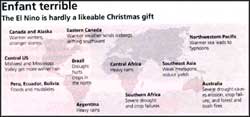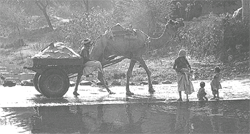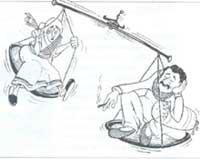
Weathering El Nino
A warm Pacific current that is the cause of much human misery appears to be brewing again

A warm Pacific current that is the cause of much human misery appears to be brewing again
In early December 2007, the country prided itself on providing the world with a road map to check the highly pathogenic avian influenza virus H5NI. Containing the virus in Maharashtra in 2006 and in Manipur in 2007 gave health authorities sufficient caus
Do you check every item you buy to make sure it is green and planet-friendly? Do you buy carbon offsets every time you fly? Stop It is time to be honest: green consumerism is at best a draining distraction, and at worst a con. While the planet's fever gets worse by the week, we are guzzling down green-coloured placebos and calling it action. There is another way. Our reaction to global warming has. gone in waves. First we were in blank denial: how can releasing an odourless, colourless gas change the climate so dramatically? Now we are in a phase of displacement: we assume we can shop our way out of global warming, by shovelling a few new light bulbs arid some carbon offsets into our shopping basket. This is a self-harming delusion. It's hard to give a sense of the contrast today between the magnitude of our problem, and the weediness of our response so far. But the best way is offered by the Nobel Prize-winning scientist Paul Crutzen. He explains that until 10,000 years ago, the planet's climate would fluctuate violently: sometimes it would veer by 12 degrees centigrade in just a decade. This meant it was impossible to develop agriculture. Crops couldn't be cultivated in this climatic chaos, so human beings were stuck as a tiny smattering of hunter-gatherers. But then the climate settled down into safe parameters, and humans could settle down too. This period is called the Holocene, and it meant that for the first time, we could develop farming and cities. Everything we know as human civilisation is thanks to this unprecedented period of climatic stability. Today, we are bringing this era to an end. By pumping vast amounts of warming gases into the atmosphere, we are creating a new era: the Anthropocene, in which man makes the weather. There is an imminent danger of it bursting beyond these safe parameters, and bringing about a return to the violent, volatile variations that prevented our ancestors from progressing beyond spears and sticks. Those are the stakes. Every week, there is greater evidence that we are nudging further from our safety zone. The hottest year of the 20th century, 1947, is now merely the average for the 21st century. And what are we doing? Many good, well-intentioned people are beginning to grasp this ' problem, and then assuming green consumerism is the only answer to hand. They shop around for items that have not been freighted thousands of miles to make it to their supermarket shelves. They change their light-bulbs. They turn down the thermostat a few degrees. They make sure they buy products that don't sit on electricity-burning standby all day. They buy the more energy-efficient cars, and scorn SUV drivers. I don't want to attack these people. They are an absolutely essential part of any solution. But we have to be honest. This is not even the beginning of a solution, and by pouring so much energy into it, we may actually be forestalling the real solution. I know a huge number of people who are sincerely worried about global warming, but they assume they have Done Their Bit through these shifted consumption patterns. The truth is: you haven't. In reality, dispersed consumer choices are not going to keep the climate this side of a disastrous temperature rise. The only way that can ever happen is by governments legislating to force us all, green and anti-green, to shift towards cleaner behaviour. Just as the government in the Second World War did not ask people to eat less voluntarily, governments today cannot ask us to burn fewer greenhouse gases voluntarily. It is not enough for you to change your bulbs. Everyone has to change their bulbs. It is not enough for you to eat less meat. Everyone has to eat less meat. It is not enough for you to fly less. Everyone has to fly less. (And yes, I hate these facts as much as you do. But I will hate the reality of runaway global warming even more.) The only way we will get to the situation where we are all required by law to burn fewer greenhouse gases is if enough people pressure the government, demanding it. Green consumer choices often drain away people's political energies to do this. You have a limited amount of time to spend on any political cause. If you have an hour a week to dedicate to acting on global warming, and you spend it scouring the supermarket shelves for the product shipped the shortest distance, that time and energy is gone; you feel you've done what you can. Part of you might also assume: I've made these choices; other people will too; in time, we'll all be persuaded. But we don't have time. There is a much better way for you to reduce the amount of greenhouse gases in the atmosphere. Every minute you would have spent shopping around for a greener choice, you should spend volunteering for Greenpeace, or Friends of the Earth, or Plane Stupid, or the Campaign Against Climate Change. Every hundred-pound premium you would spend to buy a greener product, donate it to them instead. Why? Because by becoming part of this collective action, rather than by clinging to dispersed personal choices, you will help to change the law, so everyone will have to be greener, not just nice people like you. It works. Green campaigners from Australia to Canada to Japan have successfully banned the old lightbulbs, so only the energy-saving lightbulbs are on offer there now. Green campaigners have prompted the Mayor of London to force SUV drivers to pay a punitive (pounds sterling) 6,000-a-year premium to drive through our city, forcing many of them to shift to greener cars. These are the first tiny steps towards banning, or massively restricting, the other technologies that are unleashing Weather of Mass Destruction. Of course, some sincere and well-intentioned people have libertarian concerns about this approach at first glance. Why should we force people to choose the green option? Isn't it better to rely on persuasion and voluntary choice? But even the most hardcore libertarians agree that your personal liberty ends where you actively harm the liberty of another person. Greenhouse gas emissions are undeniably harming tens of millions of people, and endangering the ground on which all human liberty rests: a stable and safe climate. Just as no libertarian would argue you should have the right to buy and fire a nuclear weapon, no libertarian should argue you have the right to burn unlimited greenhouse gases. Once confronted with this argument, the only people who cling to a libertarian defence of fossil fuels are people who take money from the fossil fuel industry itself, like Spiked Online. They have to scrape together any old excuse. So enough with the placebos. Enough with the fake-libertarian excuses. As the climate that sustains human life unravels around us, we are long past the moment when we need real medicine, and the only one we have is hard government legislation. The Independent

When villages work with each other to regenerate the environment, there are unexpected blessings. Sometimes, they are as big as a river
From the highway the gravestones were visible. Thirteen headstones, rough and blunt, carved with names of each dead tribal. Each stone was placed so that together they formed a semi circle looking

Women can get sterilised, but men will get the land. The Uttar Pradesh government's decision to reward sterilisation volunteers with a patta (DEED) for land has resulted in women going in for
<font class='UCASE'><font color=red>P Pushpangadan</font></font> , director, National Botanical and Research Institute NBRI , Lucknow, speaks to <font class='UCASE'><font color=red>Archana Srivastava</font></font> on India s biodiversity

Grapes grown in Israel s saline region are more aromatic

Indian scientists are resorting to tissue culture to salvage plants facing extinction

Scientific fodder comes of age in today"s era of specialisation and optimum use

High levels of pesticides in fruits in the US could harm children

The experience of a Kenyan community contradicts a traditional theory that population and development are inversely proportional
How will vast regions of India, where highly unreliable rainfall makes the difference between famine and sustenance, cope with climate change? Over 85 per cent of the cultivated area in this country

Latex obtained from succulents can be used to manufacture a host of products such as paints, adhesives and roofing material

An on farm storage facility has been developed to see potatoes through the summer

Myanmar has not sqandered its natural resources in an attempt to ape the West
Even the nasty little bugs are worth conserving
<p>The Bangladesh government has launched Coastal Climate Resilient Infrastructure Project in a bid to reduce poverty in the vulnerable 12 coastal districts due to climate change. Read more in this April 2014 edition of the Monthly Overview on State of Environment, Bangladesh.</p>
The largest collection of germplasm in the world will be handed over to the Food and Agriculture Organisation to ensure equal accessibility

Devrao Atram, a Kolam tribal from Maharashtra, got his land back two years ago. He had given 5 hectare (ha) on contract to a non-tribal banjara family 25 years ago. When he wanted to claim his land